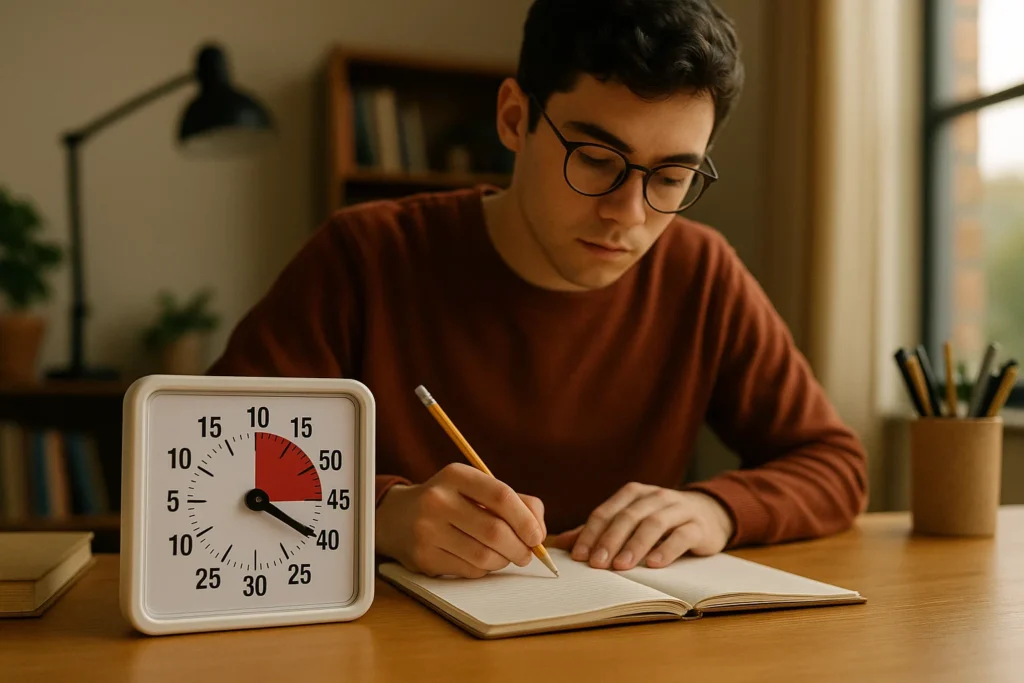
Introduction: Why Concentration Is the Key to Academic Success
In today’s fast-paced digital world, staying focused on studies can feel like a real challenge. With smartphones, social media, and endless distractions, many students struggle to concentrate on their academic work. However, concentration is not a natural talent—it’s a skill you can develop with practice and the right techniques. Whether you’re preparing for board exams, competitive tests, or just daily study sessions, learning how to focus effectively can drastically improve your performance and confidence.
In this guide, we will explore 10 effective and simple tips to improve your concentration while studying. These are practical, science-backed techniques that you can apply starting today.
1. Set a Clear Study Goal
Before you even open your books, decide what you want to achieve in that session. It could be reading a chapter, solving 10 math problems, or revising notes. Clear goals give your brain a direction.
📝 Example: “Today, I will complete Chapter 5 of Biology and take notes.”
✅ Why It Works: Your brain works better with purpose. A study published in Psychological Bulletin shows that goal-setting enhances performance and attention.
👉 Read more about goal-setting
2. Create a Dedicated Study Space
Avoid studying in bed or in noisy areas. Instead, set up a clean, quiet, and clutter-free space that is only for studying. This trains your brain to associate that place with focus.
✅ Bonus Tip: Add a study lamp and keep water nearby to stay hydrated.

3. Follow the Pomodoro Technique
The Pomodoro Technique involves studying for 25 minutes and then taking a 5-minute break. After four sessions, take a longer break of 15-30 minutes.
✅ Why It Works: It prevents mental fatigue and keeps your brain fresh.
👉 Pomodoro Method Explained
4. Minimize Distractions
Turn off notifications, put your phone in another room, and use website blockers if needed. Apps like Forest, Cold Turkey, or Freedom can help you block distractions.
✅ Pro Tip: Use airplane mode while studying.
5. Prioritize Difficult Subjects First
Your brain is most active and fresh in the first hour of study. Tackle the hardest subjects when your energy is high and leave the easier ones for later.
✅ Why It Works: Mental alertness is higher at the beginning of your study cycle.
6. Break Topics into Smaller Parts
Large topics can feel overwhelming. Instead, break them down into small chunks and focus on one sub-topic at a time.
📝 Example: Instead of “Study Geography,” go for “Revise Types of Landforms.”
✅ Why It Works: It’s easier for your brain to absorb information in smaller pieces.
👉 Chunking Technique in Learning

7. Use Active Learning Techniques
Don’t just read—write, speak, quiz yourself, or teach others. These methods involve more senses and help you retain information longer.
✅ Active learning methods include:
Flashcards
Self-quizzing
Explaining the concept to a friend
8. Eat Brain-Boosting Foods
Your brain needs the right fuel. Eat foods rich in omega-3 (like walnuts), iron (like spinach), and antioxidants (like berries). Avoid junk food, especially before studying.
✅ Bonus Tip: Drink plenty of water to avoid mental fatigue.

9. Practice Daily Meditation
Meditation improves memory, focus, and emotional control. Just 5–10 minutes of mindfulness or breathing exercises daily can significantly improve concentration.
10. Get Enough Sleep and Rest
Your brain consolidates what you learn during sleep. Avoid late-night study marathons. Try to get at least 7–8 hours of quality sleep daily.
✅ Pro Tip: A short 20-minute nap in the afternoon can recharge your brain.
Conclusion: Consistency Beats Intensity
Improving your concentration is a journey. It won’t happen overnight, but with consistent practice and the right environment, your focus will sharpen. Start with 2–3 tips from the list and gradually build up your study routine.
Remember, you’re not alone—every student struggles at some point. Stay motivated, be patient with yourself, and believe that you can train your mind to focus better. Your hard work today is the foundation of your success tomorrow.

Related Keywords
how to concentrate on studies
tips to focus on studying
how to avoid distractions while studying
study tips for students
how to improve concentration in studies
focus better while studying
increase study efficiency
best way to study effectively
how to stay focused on studies
student concentration techniques
improve focus for exams
effective study habits
how to build focus while studying
motivation for studying
study tips for school and college students
✅ Frequently Asked Questions (FAQs)
A: It depends on your attention span, but 2–3 focused hours using techniques like Pomodoro can be highly effective.
A: Yes, but only instrumental or ambient music. Lyrics can distract you.
A: Early mornings or late evenings when your surroundings are quiet and your mind is fresh.
A: Yes, apps like Forest, Notion, and Focus Booster help manage time and limit distractions.
A: Break study sessions into smaller chunks and take regular short breaks. Practicing mindfulness also helps.
